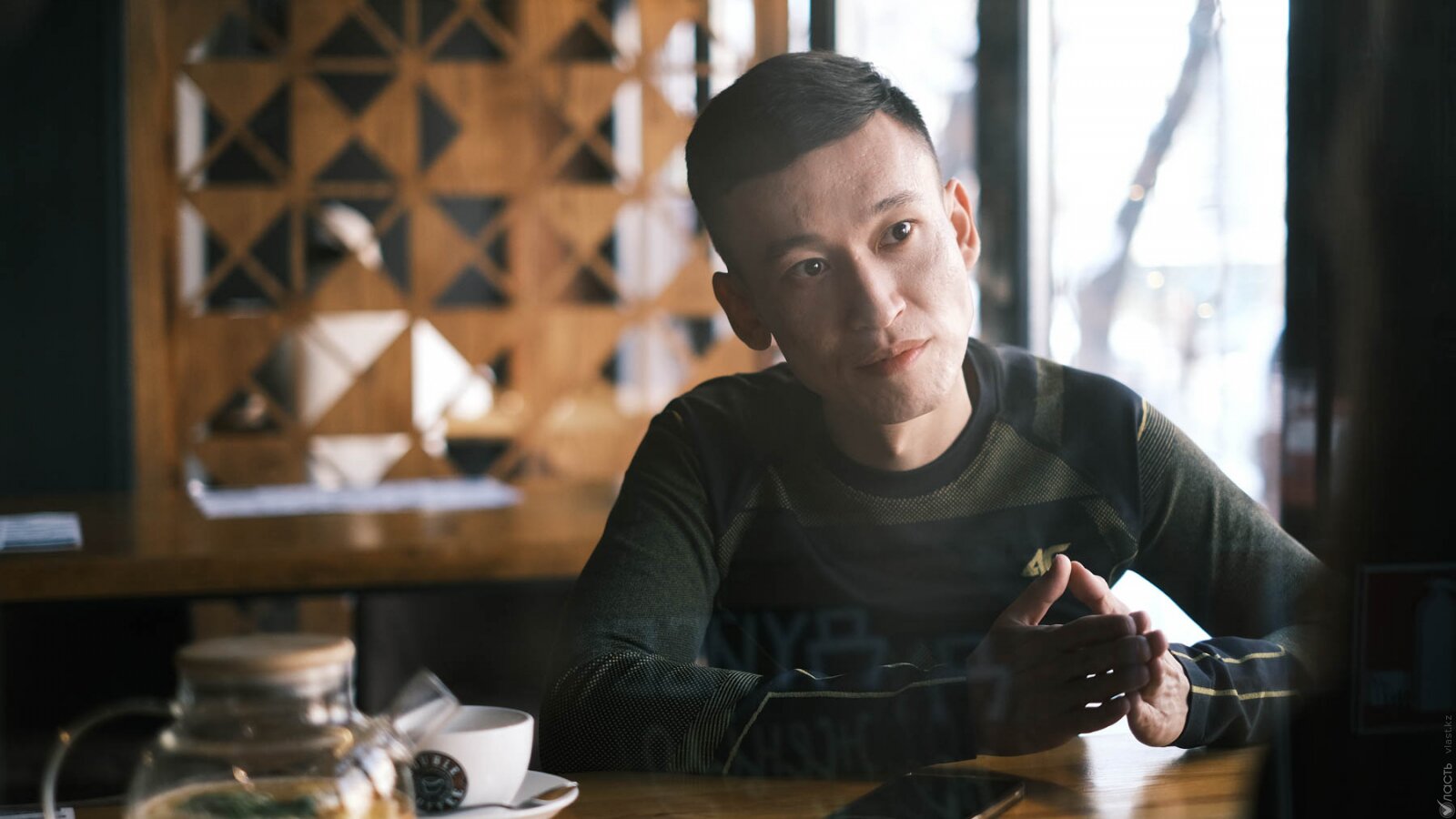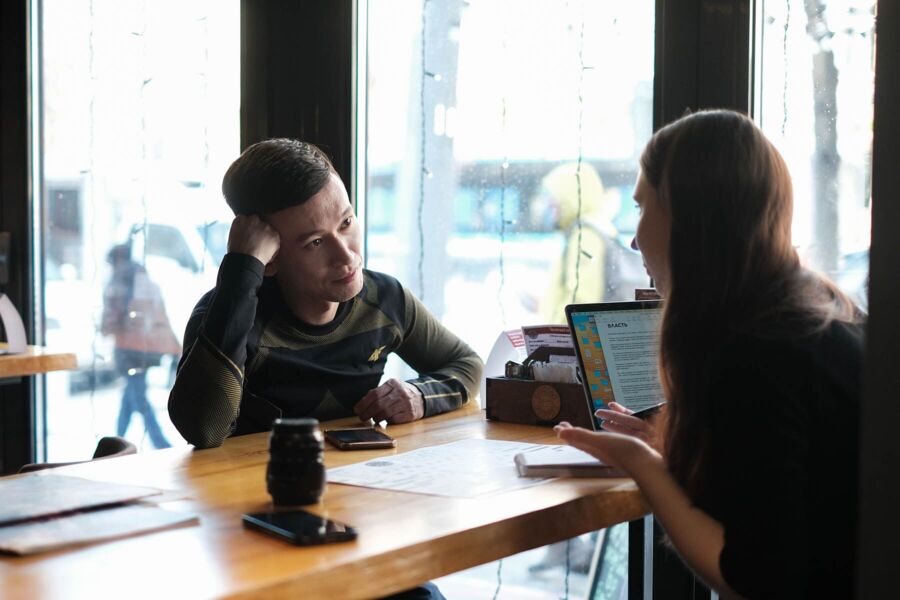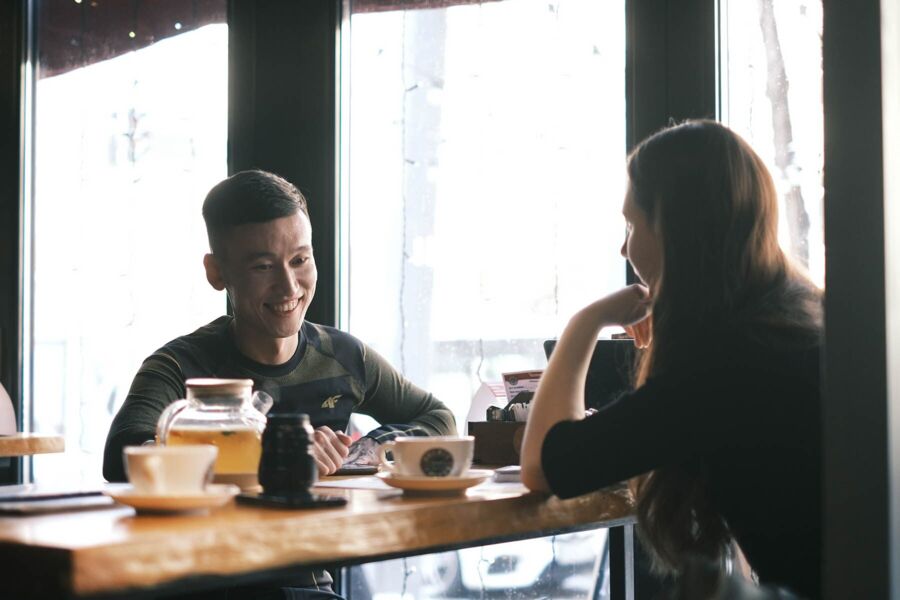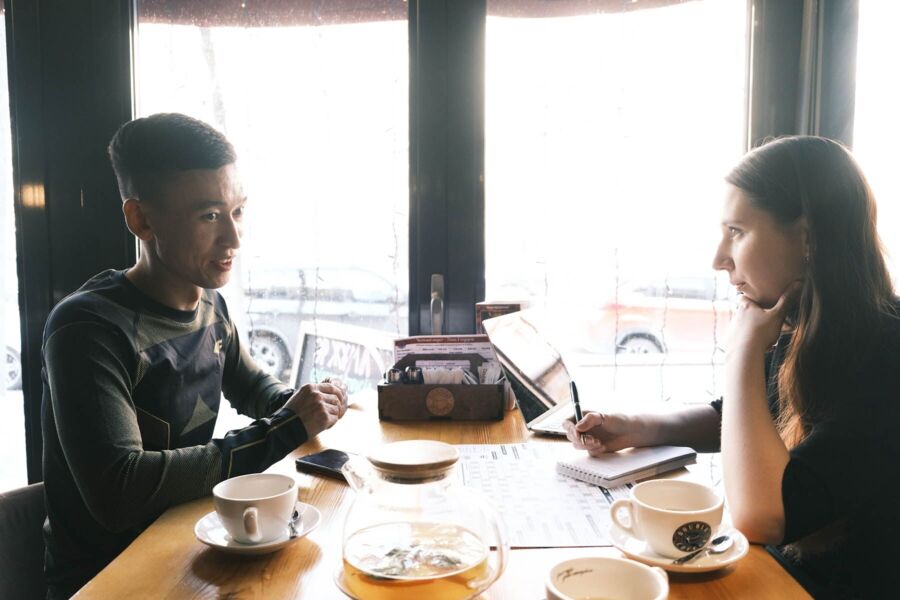The ministry of culture and information ordered the closure of Selftanu, a website designed for LGBT+ teenagers, in February on the grounds that its content was “harmful to the health and development of children.” Vlast spoke to Mutali Moskeu, who created the site earlier this year, about the connections between queer activism and decolonization, vulnerability, and Russian propaganda.
Читайте этот материал на русском.
Mutali is from the southern city of Shymkent, but lives in Almaty. While many perceive him as a queer activist, he thinks of himself as a creator of media projects. We sat down with him after Selftanu, one of his projects, was blocked by government decree.
Self-Awareness and Activism
“I began to realize some kind of queerness from my childhood,” Mutali told Vlast. “But, of course, I didn’t have any vocabulary to define it yet. I think that I knew the word ‘gay’ then, but I could not bring myself to say: ‘I am gay.’ Partly because there was no education, no awareness, and no representation at that time. There was only the movie Brokeback Mountain, and it was a very sad story.”
When he became attracted to the male protagonists of the movie, he realized something about his orientation.
“I immediately understood that this is part of me, but it was dangerous to talk about it. Fortunately, I never had any thoughts that I needed to be cured of this, for some reason I immediately understood that this was me, I needed to accept myself and live on. I just thought at the time that it needed to be hidden.”
Only in high school, Mutali began to gradually share with friends, then told a close friend about his sexuality. When Mutali started working in marketing, he found a fairly friendly environment. Telling his parents was more difficult.
“In 2020, I started making TikTok videos and speaking openly about queer and social issues,” Mutali said. “From that moment on, I became publicly open. TikTok exploded and I reached 100 thousand subscribers. I gained recognition and an audience, but I had yet to come out to my parents.”
The family unexpectedly learned about his sexuality from a relative during a quarrel.
“My parents didn’t want to talk to me about it, they discussed it among themselves. When I found out, I contacted them and talked to every family member. With my dad, the conversation was the hardest: We had a fight,” he recalled.
“My parents are religious and all this happened in the holy month of Ramadan. It was maybe because of this that my father found the need to open up. He sent me a message that simply read: ‘you are my son, I love you’.”
“Queer in Kazakh”
Mutali became engaged in queer activism at the same time as other people in his circle.
“Our conversations were wide, we talked about decolonization, and reflecting on it I realized that homophobia and anti-LGBT+ rhetoric are a product that was imposed on us by the colonizers,” Mutali said.
“For the colonialist, the binary is important: There must be a woman, there must be a man. Both should exist according to stereotypes. The colonialist is not interested in anything queer. For example, almost all the countries in the world that have the death penalty or some other very serious punishment against homosexuality were once colonies of the British Empire.”
Mutali then decided to shoot “Queer in Kazakh”, a documentary in which he and six researchers in the fields of sociology, anthropology, and human rights rethink Kazakh identity through the prism of queer optics.
Because of the widespread diffusion of the Russian language, Kazakhstan’s media space is still in many ways influenced by Russia’s, Mutali said.
“Without a realistic representation of LGBT+ people in our media, locals think that LGBT+ is only what Russian propaganda broadcasts, that is ‘something Western’ that was alien to us, that was imposed on us,” Mutali noted.
In the film, activist and researcher Zhanar Serkebayeva and artist Samal Qantar mention, among other things, the presence of queerness in Kazakh folklore and traditional performing arts.
“Kazakh folk art was primarily oral,” Mutali said. “It was when they tried to write it down in Russian that they used gender divisions, using pronouns like ‘he’ or ‘she’. But in the Kazakh language the pronoun ‘ol’ has no gender.”
“There’s a joke among queer activists, that the Kazakh language is very queer-friendly, unlike Russian,” Mutali laughed.
Now Mutali and his team are working to restore the Selftanu website, a repository of information for LGBT+ teenagers, their loved ones, parents, and teachers, both in Kazakh and Russian. Mutali launched Selftanu together with Russian LGBTQ activist and educator Sasha Kazantseva.
In February, the ministry of culture and information blocked it, saying “it was harmful to the health of children”.
“LGBT+ teenagers often learn something on TikTok, something through literature or media. But it’s all very scattered, and sometimes from unreliable sources,” Mutali said. In addition, there is practically no information in Kazakh, according to him.
“We wanted our project to become a hub where teenagers could find basic information and answers to the most popular and common questions,” Mutali added.
In addition to the sex education part, the site had a lot of other materials on how to meet people, how to confess your feelings, how to survive a breakup, and how to find friends. There were also separate sections for parents and for friends, as well as a section for teenagers on how to deal with their parents at home, at school, at university, with friends, and in a social context. The website also hosted a separate page with contacts of organizations and initiatives where LGBT+ teenagers could receive psychological or legal help, various consultations, or get tested for sexually transmitted infections.
According to Mutali, the site’s materials were also useful to older users.
Critics launched a petition to ban the site the day after the site appeared online.
The site was visited by 10,000 users in the first three days, quickly reaching the audience goal that its founders had set for the year. With widespread visibility came hate: users left a massive number of negative comments, prompting some to call for attacks against us.
“We were sent a screenshot from a Russian right-wing chat, where its users were discussing when and how to launch an attack.”
“Nobody even contacted us”
After the first signs of online hate, the founders of Selftanu sought the help of lawyers with regards to a potential blocking. But the decision was sudden and unexpected.
“Nobody even contacted us, no one told us: ‘You have articles like this, they violate the law, delete them.’ Only after media outlets requested clarification, the ministry said that the website would be restored if certain articles were taken down,” Mutali said.
The hosting company indicated which articles were targeted by the blocking request.
“One of these was an article about roles in sex. Another one was titled: ‘Do I have to look like an LGBT+ person’? To be honest, we did not fully understand why some articles violate some laws.”
The founders are now sending a letter to the ministry of culture and information, but are convinced that they would have to go to court to see their website restored.
“I want to educate, I have so many ideas, I want to do so many things, but I’m spending my time and resources now on a completely illegal decision against us,” Mutali said.
Mutali believes that government agencies decided to block their website because of pressure from anti-LGBT+ groups.
The blocking of Selftanu came before and after a series of ant-LGBT+ decisions: A bill on child safety which would prohibit LGBT+ from fostering children without parental care was approved by the Senate and sent for ratification on February 7; A protest called in honor of International Women’s Day, in which participants demanded a special law banning LGBT+ people. These are alarming trends, according to Mutali.
In the film “Queer in Kazakh,” experts said that hatred of LGBT+ people is often artificial and politically constructed. Mutali added that members of the community themselves are open and ready to support other discriminated groups.
“Queer initiatives came into play when the January events happened [The repression of urban protests in January 2022, also known in Kazakh as Qandy Qantar, ‘Bloody January’ - ed.]. Many people who had survived torture, and their relatives organized crowdfounding, they needed help. And I know that a lot of queer initiatives raised money for them,” Mutali said. “We also organized a quiz and a fair with the Qazaq Genius project, and we donated all the funds we collected to people who survived torture.”
Mutali also hopes that there will be more solidarity between different oppressed groups in the future.
“I think we'll get there,” he said. “I see many more allies now than before. When the petition [against the Selftanu website] was launched, people wrote: ‘Will someone start a petition to raise pensions?’ or ‘will someone start a petition against corruption?’ I’m very glad to see that people understand that we are not some kind of evil, like the government depicts us.”
Поддержите журналистику, которой доверяют.











